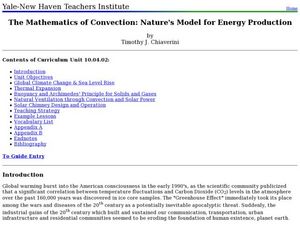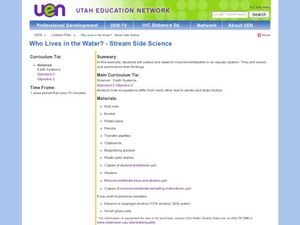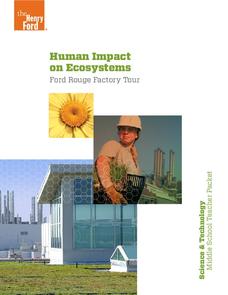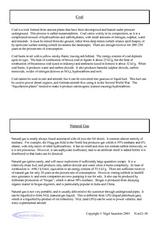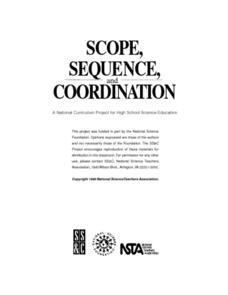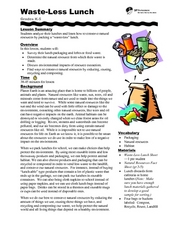Rainforest Alliance
Get in Touch with Nature
Take a trip to the Colombian rainforest through the sense of touch. Here, class members discover what's inside a mystery box: wood, cinnamon, Brazil nuts, a banana, and orange. Then, the class takes a trip outside for a tree rubbing...
Curated OER
Observing Natural Science in Action
In this observing science in action instructional activity, learners look at a picture and answer a set of 6 "observation questions." Answers are included on page 2.
Curated OER
Nature Rules In The Great Flood of 1993
Pupils examine the event of the Great Flood of 1993. Using the internet, they research the economic, social and ecological changes that impacted the area. They conduct a town meeting in which they debate the positives and negatives of...
Curated OER
Soils: One of Our Natural Resources
"God made dirt, so dirt don't hurt!" In fact, dirt is soil, which is an amazingly dynamic material that we cannot live without! Dig into the depths of soil development, topography, and layers with this PowerPoint. The photos are fuzzy,...
Curated OER
The Mathematics of Convection: Nature's Model for Energy Production
High schoolers conduct a series of experiments to investigate density, buoyancy and climate. In this math lesson, pupils design and build a hot air balloon to demonstrate convection. They research and write a paper about solar chimneys.
Curated OER
Chapter 1: The Science of Biology
Provide young biologists with everything they need to excel in the study of lymphatics, the nervous system, hormones, cellular division, and more! Pupils utilize the workbook, complete with end-of-chapter assessment worksheets, to...
Curated OER
"Croak" Science Mystery
Solve the mystery of a declining frog population! Lead your junior ecologists on an investigation that simulates actual events concerning pollution, predation, poaching, and more. Investigators read a story online, then analyze survey...
Curated OER
Who Lives in the Water? Stream Side Science
Andree Walker thought of everything when he wrote this resource. It includes a detailed list of materials and background information links for the teacher. In addition, it has procedures, a macroinvertebrate identification key, and tally...
Forest Foundation
The Nature of Trees
Young botanists examine the different parts of tress and then draw parallels between the functions of these parts and the function of parts of the human body.
Curated OER
Clouds
Incorporate art and poetry into an early elementary science lesson about cloud formation. With fun and engaging activities that follow a natural learning progression, youngsters will develop key vocabulary and conceptual understanding...
Henry Ford Museum
Human Impact on Ecosystems
An environmenta science unit includes three lessons plus a cumulative project covering the ecosystem. Scholars follow the history of the Ford Rouge Factory from its construction on wetlands and how it destroyed the...
National Wildlife Federation
Why All The Wiggling on the Way Up?
Some of the CO2 emitted by burning fossil fuels is removed from the atmosphere by natural sinks, such as the ocean. The fifth engaging lesson in the series of 21 examines the CO2 data from three very different locations. It then makes a...
Curated OER
In Case of Emergency
A natural disaster could strike at any time: do your learners know the school and community emergency plans? Start the school year by honing research and speaking skills in a practical way with this preparedness instructional activity....
Curated OER
Our Disastrous World
Students explore natural disasters around the world from the experiences of other students, friends and families. They collaborate with countries such as Japan, China, India, Australia, Russia, Great Britain as well as from the United...
Berkshire Museum
Meet a Naturalist: Researching, Writing, Interviewing
Young scholars reach out into the community and learn about different environmental science careers in this inquiry-based instructional activity. Beginning with a short research assignment, children gain background knowledge about...
Creative Chemistry
Fuels - The Good, the Bad, and the Ugly
Science pupils choose from twelve questions about five different types of fuel: hydrogen, ethanol, crude oil, natural gas, and coal. They construct a table to compare them and then determine the best fuel. Your physical science class...
Curated OER
Everything is Made of Something
Young scientists can use this worksheet to learn about natural resources, as well as what we use them for. A word search prompts pupils to find sixteen words about natural resources.
Curated OER
Bird Brilliance!
First graders explore natural resources and search outdoors to find materials to create a bird's nest. In this bird's natural resources lesson, 1st graders listen to a book about birds and reflect on the various things birds use to...
Curated OER
Variations in Living Things
Biology beginners observe traits in a collection of plant parts to realize the tremendous amount of genetic variation within a species. They consider rules of nature and discuss what would happen if they changed. They also examine data...
SF Environment
Waste-Less Lunch
Is it possible to have a waste-less lunch? Can your class become leaders in conservation? Discuss the importance of reducing waste during lunch time with a fun lesson plan that can be extended to everyday practices. First the class...
Virginia Department of Education
Go with the Flow
How does nature's hierarchy relate to our local human environment? Answer this question, along with others, as the class visually depicts the natural hierarchy provided by nature. Pupils discuss each piece of the pyramid and its energy...
Curated OER
The Oil Field Industry
A brief look at natural resources are described, prior to explaining the importance of oil in this 12-slide PowerPoint. Clear and colorful graphics are on each slide to keep viewers interested and more informed. Tip: Ask students how...
K12 Reader
Limited Resources
Here's a comprehension exercise that asks readers to include direct quotes in their analysis of an article on ways to conserve natural resources.
Curated OER
Energy Resources: Where Are They and How Do We Get Them?
Future energy engineers visit several stations, each one dedicated to a different alternative source of energy. They describe how solar energy is converted into other forms of energy, the patterns of distribution of energy resources in...
Other popular searches
- History and Nature of Science
- The Nature of Science
- Nature of Science Biology
- Nature of Science Inquiry
- Nature of Science Physics
- History Nature of Science
- Science Patterns in Nature
- Genetics Nature of Science
- Teaching Nature of Science
- Nature of Science Weather
- Genetic Nature of Science
- Science and Nature






